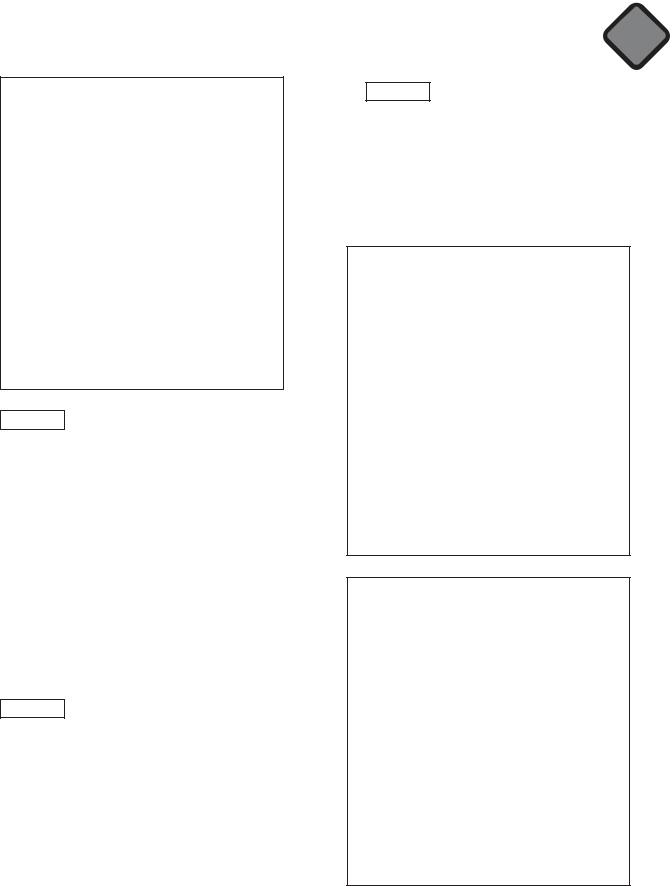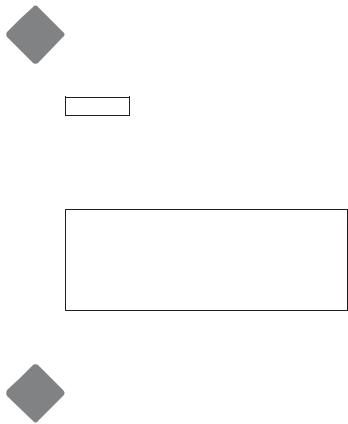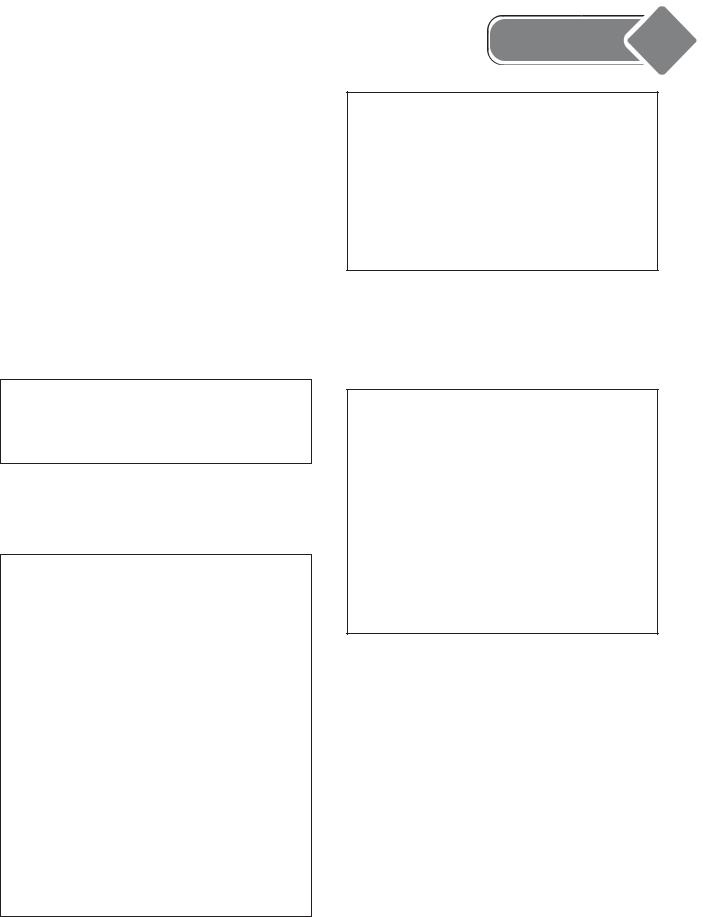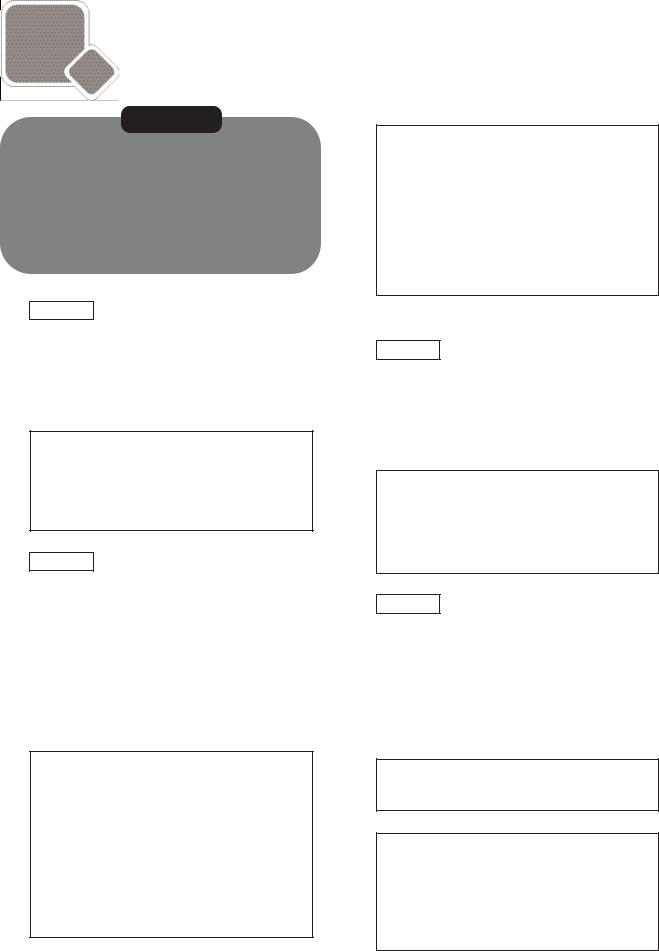
Учебники школьные / анг яз уч ответы
.PDF
on the actual day
ñlisten to the bells chime midnight
ñkiss and wish each other ‘Happy New Year’
ñlisten to traditional music
ñjoin hands and sing
ñvisit friends and neighbours
3Focus Reading for comprehension (matching
paragraphs to headings)
ñHave Ss read the text and complete the task individually.
ñElicit answers from Ss around the class.
Answer Key
1 C |
2 D |
3 B |
4 A |
4Focus Identifying adjectives and adverbs in
descriptions
ñRead the study skills box with Ss.
ñHave Ss find examples in the text of vivid descriptions and the adjectives and adverbs used.
Answer Key
You should use a variety of descriptive adjectives and adverbs to make a descriptive article more vivid and lively.
examples from text: live concerts, fabulous carnivals, excited people, colourful costumes, watch excitedly, heartily wishes, proudly sing, traditional song, stunning fireworks display, great celebration
5Focus Practising using adjectives in
descriptions
ñRefer Ss to the two texts and read through the list of adjectives and check Ss understand their meanings.
ñDirect Ss to pay attention to what is being described by the adjectives and choose the appropriate adjective that fits with the meaning of the sentence.
ñSs complete the task individually.
ñInvite Ss to read the text in class and check their answers.
|
|
|
Writing Skills |
1e |
|||
|
|
|
|
|
|
||
|
|
|
|
|
|
|
|
Answer Key |
|
|
|
|
|
||
A |
1 |
tall |
4 |
stunning |
|
|
|
|
2 |
colourful |
5 |
enthusiastic |
|
|
|
|
3 |
festive |
|
|
|
|
|
B |
1 |
Local |
|
4 |
delicious |
|
|
|
2 |
brightly decorated |
5 |
huge |
|
|
|
|
3 |
crowded |
|
|
|
|
|
|
|
|
|
|
|
|
|
6Focus Practising using adverbs in descriptions
ñDirect Ss to pay attention to the verb being described and choose the appropriate adverb.
ñHave Ss complete the task individually.
ñInvite Ss to read out answers in class for checking.
Answer Key |
|
|
|
1 |
patiently |
4 |
proudly |
2 |
happily |
5 |
enthusiastically |
3 |
excitedly |
|
|
|
|
|
|
Writing
7 a) Focus Understanding a rubric
ñHave Ss read the rubric and underline the key words.
ñElicit from Ss the key words and answers to the questions in the rubric and write them on the board.
Answer Key
Key Words: teenage magazine, descriptive writing competition, ‘Celebrations Around the World’, article describing a celebration, 120180 words
I will write a descriptive article.
It is for readers of a teenage magazine.
b) Focus Writing a descriptive article of an
event
ñRead through the plan with Ss and discuss.
ñHave Ss answer the questions from the plan and write the plan and their answers down in their notebooks.
ñDirect Ss to write their articles following their plans. Alternatively assign the task as HW.
ñInvite Ss to read their articles in class and ask for feedback from the class.
23

1e Writing Skills
Suggested Answer Key
Ivan Kupala Day is celebrated all over Russia and takes place usually on 7th July. It is held to celebrate the holiday of St John the Baptist (Ivan Kupala) and it is still very popular today with young Russians.
Everything about the celebration relates to water. On the evening before called Tvorila night, children have playful water fights and throw buckets of water all over each other.
Some people consider Ivan Kupala day to be the first day of the swimming season and if the water is warm enough, boys and girls often
swim happily in rivers and lakes until late at night. Girls like to float candles and delicate flowers in the hope that it will bring them happy marriages. In the past, young people used to burn fires and jump joyfully over them holding hands. There is also a belief that on the eve of Ivan Kupala magical herbs can be found in the forests.
In villages all over the country, people look forward to Ivan Kupala Day enthusiastically. It is an ancient celebration which continues to be fun for all family members whatever their ages.
1 |
f |
English in Use |
|
|
|
|
|
|
|
|||||||
|
|
|
|
|
|
|
|
|
|
|
|
|
|
|||
|
|
|
|
|
Objectives |
|
|
|
|
|
|
|
|
|||
Vocabulary: |
past/present |
participles (-ed, -ing); |
|
b) |
Focus |
Discussing the topic of a text/ |
||||||||||
|
|
|
Practising past and present participles |
|||||||||||||
phrasal verbs (turn); prepositional phrases; words |
|
|
|
|||||||||||||
|
|
|
|
|
|
|
|
|||||||||
often confused (habit/ tradition/custom, spectators/ |
|
|
|
ñ Allow Ss a few minutes to think about what |
||||||||||||
audience/crowd, let/ make/allow, luck/chance/ |
|
|
|
they want to tell the class. Direct Ss to use |
||||||||||||
opportunity) |
|
|
|
|
|
|
|
past/present participles in their presentation. |
||||||||
Speaking: talking from notes; discussing a school |
|
|
|
ñ Invite Ss to tell the class about what they |
||||||||||||
celebration; revising grammar |
|
|
|
|
|
think of April Fool’s Day. Check for correct |
||||||||||
|
|
|
|
|
|
|
|
|
|
|
|
use of past/ present participles. |
||||
|
|
|
|
|
|
|
|
|
|
|
|
|
|
|||
|
|
|
Forming past/present participles |
|
|
|
|
|
|
|
||||||
1 a) |
|
Focus |
|
|
|
|
|
|
|
|||||||
|
Suggested Answer Key |
|
||||||||||||||
|
|
(-ed, -ing) |
(word formation) |
|
I think April Fool’s day is exciting. It is a great |
|
||||||||||
|
|
|
|
|
|
|
|
|
|
|
|
|||||
|
|
ñ Read the language box and check Ss |
|
way to play jokes on people and get away with |
|
|||||||||||
|
|
|
understand when we use past and present |
|
it. I feel thrilled when I play a joke on |
|
||||||||||
|
|
|
participles. |
|
|
|
|
|
someone. It’s lots of fun. I don’t get annoyed |
|
||||||
|
|
ñ Have Ss complete the task individually. |
|
or angry if someone plays a joke on me. It’s all |
|
|||||||||||
|
|
ñ Read the text in class and check Ss’ answers. |
|
part of the fun. It’s not just another boring |
|
|||||||||||
|
|
|
|
|
|
|
|
|
|
|
day like all the others. |
|
||||
|
|
|
|
|
|
|
|
|
|
|
|
|
|
|
||
|
Answer Key |
|
|
|
|
|
|
|
|
|
|
|
|
|||
|
|
|
|
|
|
|
|
|
|
|
|
|||||
|
1 |
|
tiring |
|
5 |
amazing |
|
2 |
|
|
Practising vocabulary |
|||||
|
Focus |
|||||||||||||||
|
2 |
|
annoying |
|
6 |
bored |
|
|
|
|
|
|
|
|
||
|
ñ Have Ss complete |
the task individually and |
||||||||||||||
|
3 |
|
embarrassed |
7 |
surprising |
|
|
|||||||||
|
|
|
|
|
check in their dictionaries if necessary. |
|||||||||||
|
4 |
|
excited |
|
8 |
exhausting |
|
|
|
|
||||||
|
|
|
|
ñ Ask Ss to read their sentences out and check Ss’ |
||||||||||||
|
|
|
|
|
|
|
|
|
|
|||||||
|
|
|
|
|
|
|
|
|
|
|
|
answers. |
|
|
|
|
|
|
|
|
|
|
|
|
|
|
|
|
|
|
|
|
|
|
|
|
|
|
|
|
|
|
|
|
Answer Key |
|
|
|
||
|
|
|
|
|
|
|
|
|
|
1 |
tradition |
3 |
let |
|||
|
|
|
|
|
|
|
|
|
|
2 |
audience |
4 |
chance |
|||
24

Suggested Answer Key
1My sister has the bad habit of interrupting people when they are in the middle of a conversation.
Storytelling is a popular custom in Ireland.
2 Thousands of spectators gathered to watch the popular sporting event.
A huge crowd lined up to get tickets to the Shakira concert.
3Ian’s Mum made him clean up his room before he went to the cinema.
Sue’s parents don’t allow her to go out on school nights.
4Some people believe that a rabbit’s foot brings good luck.
The celebration was a great opportunity for John to see all his old friends again.
3Focus Practising phrasal verbs
ñExplain that the verb is already in the sentence and they must fill in the correct particle to form the phrasal verb that applies to the meaning in the sentence.
ñSs complete the task individually and check their answers in Appendix 1.
ñAs an extension, invite Ss to make up other sentences with the phrasal verbs and tell the class.
Answer Key |
|
|
|
|
|
1 |
up |
3 |
into |
5 |
up |
2 |
down |
4 |
back |
6 |
off |
|
|
|
|
|
|
4Focus Practising dependent prepositions
ñHave Ss complete the task individually and check their answers in Appendix 2.
ñExplain that the word in front of the preposition and the preposition form a phrase.
ñAs an extension, ask Ss to make up their own sentences with phrases and read them in class.
Answer Key |
|
|
|
|
|
||
1 |
in |
3 |
of |
5 |
with |
7 |
in |
2 |
for |
4 |
for |
6 |
of |
8 |
with |
|
|
|
|
|
|
|
|
English in Use 1f
5 a) Focus Talking from notes/Revising grammar structures
ñRead the rubric with Ss. Direct Ss to brief notes (not full sentences) headings and use them in their talk class.
ñInvite Ss to talk to the class and ask feedback. Remind Ss to use present
Suggested Answer Key
ñname of celebration
Students’ Day
ñwhen and where it takes place
25th January, Russia
ñhow long people have celebrated it since 1755
ñhow people celebrate it:
―Students and teachers exchange gifts
―awards are given out
―a symbolic cup of knowledge is lit
―watch musical performances, comic sketches and fireworks
ñhow people feel about it
―love it
―popular with students
―time to relax
Suggested Answer Key
Student’s Day is one of the most popular celebrations with young people in Russia, as it marks the end of winter exams. It takes place on 25th January and has been a tradition since 1755 when the Moscow University was established. On this day students and professors exchange gifts, awards are given to outstanding students and at the Lomonosov monument a cup which symbolises knowledge is lit. There are also musical performances, comic sketches and a magnificent fireworks display in the evening.
Student’s Day is loved by everyone but it is especially popular with young people as it allows them to relax and forget about their exams for a day.
25

1f |
|
English in Use |
||
|
|
|
|
Discussing a school celebration |
|
|
|
||
|
b) |
Focus |
||
|
|
|
|
|
|
|
|
|
|
A:Yeah, then we made Earth Day crafts such as recycled magazine holders, colourful Earth Day kites and tin can sculptures that were displayed in the arts and crafts Earth Day school exhibit.
B:We also held a ‘Green’ poster competition and ended the day with a tree planting ceremony.
A:I felt proud to be a part of the Earth Day celebration.
B:Me too. It gave me a sense of satisfaction to know that I was doing something valuable to help protect our planet.
|
1 |
|
|
|
Culture Corner |
|
|
|
|
|
|
|
|
|
|
|
|
|
|
|
||
|
|
|
|
|
|
|
|
|
|
|
|
|
|
|
|
|
|
|
|
|
|
|
|
|
|
|
|
|
|
Objectives |
|
|
|
|
|
|
|
|
|
|
|
|
|
|
|
|
|
|
|
|
reading for specific information |
|
|
|
|
Answer Key |
|
|
|
|
|
|
||||||
|
|
|
|
|
|
|
|
|
1 |
F |
2 |
|
F |
3 T |
4 Ns |
5 |
Ns |
|
||||
|
|
|
|
|
summarising a text and talking from |
|
|
|
|
|
||||||||||||
|
|
|
|
|
a short article about a cultural event |
|
|
|
|
|
|
|
|
|
|
|
|
|
|
|
||
|
|
|
|
|
|
|
|
|
|
|
|
|
|
|
|
|
|
|
|
|||
|
|
|
|
|
|
|
|
|
|
b) |
Focus |
Understanding new vocabulary |
||||||||||
|
|
|
|
|
|
|
|
|
|
|
|
|
ñ Refer Ss to the words in bold and explain |
|||||||||
|
|
|
|
|
|
|
|
|
|
|
|
|
||||||||||
|
|
|
|
|
|
Predicting the topic of a text/Reading |
|
|
|
that they should use the context of the text |
||||||||||||
|
|
for confirmation |
|
|
|
|
|
to understand their meanings and match |
||||||||||||||
|
ñ Refer Ss to the pictures and the title of |
the |
|
|
|
them with their synonyms. |
|
|
|
|||||||||||||
|
|
|
|
ñ Elicit answers and check. |
|
|
|
|
||||||||||||||
|
|
|
|
text. |
|
|
|
|
|
|
|
|
|
|||||||||
|
|
|
|
|
|
|
|
|
|
|
|
|
|
|
|
|
|
|
||||
|
ñ Play the recording. Elicit from Ss what they |
|
|
|
|
|
|
|
|
|
|
|
|
|
||||||||
|
|
|
|
think a Pow-Wow is and discuss. |
|
|
|
|
Answer Key |
|
|
|
|
|
|
|||||||
|
ñ Have Ss read the text to check their answers. |
|
|
spectacular ― impressive |
|
|
|
|
||||||||||||||
|
|
|
|
|
|
|
|
|
|
|
|
arena ― stadium |
|
|
|
|
|
|||||
|
|
|
Suggested Answer Key |
|
|
|
|
explodes ― bursts |
|
|
|
|
|
|||||||||
|
|
|
I |
think the music and the title of the text |
|
|
|
trader ― seller |
|
|
|
|
|
|||||||||
|
|
|
|
|
|
display ― exhibit |
|
|
|
|
|
|||||||||||
|
|
|
relate to a Native American festival. |
|
|
|
|
|
|
|
|
|
||||||||||
|
|
|
|
|
|
|
handicrafts ― crafts |
|
|
|
|
|||||||||||
|
|
|
|
|
|
|
|
|
|
|
|
|
|
|
|
|||||||
|
|
|
|
|
|
|
|
|
|
|
|
stalls ― stands |
|
|
|
|
|
|||||
|
|
|
|
|
|
|
Reading for specific information |
|
|
treats ― refreshments |
|
|
|
|
||||||||
|
2 a) |
|
Focus |
|
|
|
|
|
|
|||||||||||||
|
|
|
|
|
(T/F/NS) |
|
|
|
|
|
|
|
|
|
|
|
|
|
|
|
|
|
|
|
|
|
|
|
|
|
|
|
|
|
|
|
|
|
|
|
|
||||
|
|
|
|
ñ Have Ss read through the statements (1-5) |
3 |
|
|
|
Summarising a text/Talking from notes |
|||||||||||||
|
|
|
|
|
Focus |
|||||||||||||||||
|
|
|
|
|
and underline the key words. |
|
|
ñ Refer Ss |
to |
the |
headings |
and explain |
they |
|||||||||
|
|
|
|
ñ Ss read the text again and complete |
the |
|||||||||||||||||
|
|
|
|
|
|
|
should make notes about the text under the |
|||||||||||||||
|
|
|
|
|
|
|
|
|
|
|
|
|
||||||||||
task individually.
ñ Read out the answers in class and check.
headings.
ñ Ss listen to and read the text and make their notes.
26

ñInvite Ss to tell their partner a summary of the text using their notes to guide them.
Answer Key
ñwhat is it & where it takes place
―Pow-Wow celebration, Indian way of life
―New Mexico
ñwhat people do
―dance/sing, represent their tribes
―win prizes
ñfood & music
―food stalls
―enchiladas, bannock or tostados
―listen to the musical rhythms of Native American culture
ñhow people feel about it
―magnificent celebration
―one of the most colourful, entertaining events in the USA
Suggested Answer Key
The Albuquerque Pow-Wow is a celebration of the Indian way of life and it takes place in New Mexico. Thousands of people sing and dance and represent their tribes and at the end of the event the best dancers win prizes. People can listen to the musical rhythms of Native American culture and for anyone who’s hungry, there are food stalls with treats such as enchiladas, bannock or tostados. Visitors to the Pow-Wow think it’s a magnificent celebration and one of the most colourful and entertaining events in the USA.
4Focus Writing an article about a cultural
event in your country
ñHave Ss research a cultural event in their country and make notes under the headings from Ex. 3.
ñDirect Ss to write their article using their notes as a guide. Alternatively, assign the task as HW.
ñInvite Ss to read their articles in class and ask the class for feedback.
Culture Corner |
1 |
|
|
Suggested Answer Key
Notes
ñwhat is it & where it takes place
―Arts Festival
―celebrates ballet, opera, classical music
―St Petersburg, end of June/begin July
ñwhat people do
―attend concerts at St Petersburg Philharmonic Hall
―theatre performances
―street events
ñfood & music
―drink/refreshment, city streets
―music, concerts, famous singers
ñhow people feel about it
―festive mood, proud of culture & history
Suggested Answer Key
The White Nights Arts Festival is one of St Petersburg’s liveliest cultural events. It is a famous festival held at the end of June and the beginning of July. People from all over the world visit the city to celebrate the arts of ballet, opera and classical music.
Many musical concerts take place in the St Petersburg Philharmonic Hall. There are theatrical performances and street events too. Drinks and refreshments are sold along the city’s streets and music concerts with famous singers get everyone feeling in a festive mood. This event makes Russian people feel proud of their culture and history.
27

1 |
Across the Curriculum – PSHE |
|
|
Objectives
Reading: reading for gist; reading for specific information
Speaking: discussing the topic of a text; giving a talk; discussing a quotation
1Focus Introducing the topic
Read through the rubric with Ss and discuss the questions as a class .
Suggested Answer Key
It is important for a person to remember birthdays and anniversaries each year. These events are special to most people and by remembering them, you are able to show a relative, friend, or colleague that you care about them, and that they are appreciated and have not been forgotten.
Events such as Independence Day, religious holidays or celebrations that honour a certain individual are occasions that are important for a society to remember. They remind the people of a particular country of their unity as a nation.
2Focus Predicting the topic of a text/
Reading for confirmation
ñRefer Ss to the pictures. Have Ss listen to and read the verse of the poem.
ñElicit answers to the questions in the rubric and write a few of their ideas on the board.
ñHave Ss read the text to check their answers.
Suggested Answer Key
The British remember the millions of soldiers who died fighting for their country from 1914 to 1918. They hold memorial services all over Britain and take part in a two-minute silence. They also wear poppies, read poems and listen to traditional wartime songs.
3Focus Reading for gist (matching
paragraphs to headings)
ñRead the study skills box and check Ss understand how to complete the task.
ñHave Ss read the headings and then the text searching for key words related to the headings.
ñSs complete the task individually.
ñCheck Ss’ answers in class and ask Ss to justify them.
Answer Key
A 3 special service, old war veterans lay wreaths, a two-minute silence, traditional wartime songs
B 2 the poppy is the symbol of Remembrance Day, delicate flowers, live for a short time, look like fields of blood
C 1 Remembrance Day, or Poppy Day … takes place each year on 11th November to remember the millions who died for their country.
Heading D does not match because emotions are not mentioned in the text, but rather the way in which the occasion is commemorated.
4Focus Reading for specific information/
detail
ñHave Ss scan the text for information related to the listed items.
ñIn pairs Ss tell their partners.
ñMonitor the activity and assist as necessary.
Answer Key
ñ11th November = World War I ended
ñPoppy Day = also known as Remembrance Day
ñwreaths = old war veterans lay them on the steps of the Cenotaph.
ñfields of bright red poppies = look like the blood from the soldiers
ñthe Royal Family = attend a special service
ñtwo-minute silence = at 11 am people stop talking all over Britain for two minutes
ñtraditional songs = are played at the memorial services
5Focus Understanding new vocabulary
ñRefer Ss to the words in bold and explain that they should use the context of the text to understand the meanings and match them with their synonyms.
ñHave Ss write their own sentences with the words in bold.
ñElicit answers and check.
28

Across the Curriculum – PSHE |
1 |
|
|
Answer Key
takes place ― happens delicate ― easily damaged pointed out ― remarked top ― important
attend ― go to lone ― single bugle ― trumpet signal ― mark
Suggested Answer Key
The festival takes place every year during the month of July.
The vase is very delicate, so be careful not to break it.
I pointed out that the two-minute silence had begun.
The rock singer was considered to be the top celebrity at the event.
My grandfather couldn’t attend the memorial service this year.
A lone figure was standing over by the tree. My brother plays a bugle in the school band. The referee blew the whistle to signal the end of the game.
6Focus Practising vocabulary
ñHave Ss complete the task individually.
ñElicit answers and check.
Answer Key |
|
|
1 Remind |
2 remember |
3 memorise |
Suggested Answer Key
1 Can you remind me to call my mum later? 2 I can’t remember what to do.
3 I can memorise phone numbers easily.
Speaking
7 a) Focus Reading/Listening for specific
information
ñHave Ss reread and listen to the text. Direct Ss to pay attention to three facts they would like to remember.
ñIn pairs Ss discuss their three facts text.
ñMonitor the activity and assist as
Suggested Answer Key
A:I would like to tell my family Remembrance Day takes place on November in Britain, it honours people who have given their lives for
country and that British people wear a red paper poppy to commemorate Remembrance Day.
B:I would like to tell my family that the poppy is the symbol of Remembrance Day because after World War I they were the only poppies that grew on the battlefields. Also, many poems have been written for Remembrance Day and people around Britain hold memorial services and take part in a two-minute silence.
b)Focus Giving a talk on a war veteran’s
day
ñRead the rubric and check Ss understand the task.
ñDirect Ss to collect information and make notes under the headings.
ñInvite Ss to tell the class about this day and ask the class for feedback.
Suggested Answer Key
Victory Day in Russia is a national holiday that is held on 9th May. It officially marks the day when the war ended in 1945 and the main reason for the celebration is to remember the people who died or took part in the war in another way. For example, some citizens who did not fight had to work in the factories making guns.
On 9th May, people lay flowers on graves, veterans march in parades wearing their medals and the President of Russia sends out letters to congratulate the veterans for their bravery. In homes all over Russia families enjoy eating huge feasts and giving presents to one another.
29

1 |
Across the Curriculum – PSHE |
|
|
of Wisdom
Discussing a quotation
ñHave Ss discuss the quotation and what it means in pairs or small groups.
ñInvite each pair/group to tell the class what they think the quote means and discuss.
Suggested Answer Key
The quotation wants to point out that it is never established or decided who wins a war. We only find out who has survived it by counting the fatalities.
1 |
Progress Check |
|
|
Check 1 and Look at Module 2 should be done in one lesson.
Key |
|
|
|
|
|
|
|
|
|
|
|
|
|
|
parade |
6 |
pull |
3 |
1 |
exciting |
|
|
|
4 |
thrilled |
|
|
||
place |
7 |
throwing |
|
2 |
boring |
|
|
|
|
5 |
surprised |
|
|
|
display |
8 |
final |
|
3 |
annoying |
|
|
|
|
|
|
|
|
|
raise |
9 |
won |
|
|
|
|
|
|
|
|
|
|
|
|
change |
10 |
life |
4 |
1 |
which |
|
|
|
|
4 |
whose |
|
|
|
|
|
|
|
2 |
who |
|
|
|
|
5 |
when |
|
|
|
have you done |
6 |
are watching |
|
3 |
where |
|
|
|
|
|
|
|
|
|
does not believe |
7 |
Are you looking |
|
|
|
|
|
|
|
|
|
|
|
|
starts |
8 |
hasn’t seen |
5 |
1 |
in |
2 |
with |
3 |
in |
|
4 |
of |
5 |
for |
looks, has lost |
9 |
has been digging |
|
|
|
|
|
|
|
|
|
|
|
|
smells |
10 |
has been working |
6 |
1 |
d |
2 |
a |
3 |
b |
|
4 |
e |
5 |
c |

Life & Living |
Module |
2 |
|
|
|
Before you start …
Work through the questions with the class, asking follow up questions to encourage Ss to expand on their answers as much as possible. (e.g. Do you believe in good/bad luck? Why (not)? What superstitions do you have in your country? What special occasions do you like to celebrate? Why? Have you ever been to a carnival? What did you do at it? What did you like about it?)
Look at Module 2
ñRefer Ss to the title of the module, Life & Living, and invite them to suggest what they think it means and what they expect to learn from the module.
Suggested Answer Key
I think the title means how we live our lives and where we live. We will probably learn about life in different homes, neighbourhoods and families.
ñAsk Ss to look through the module and find the page numbers for each of the pictures. Ask questions to stimulate a discussion about them.
Suggested Answer Key
Focus Ss’ attention on pic 1 (p. 25).
T: What page is the picture on? S1: It’s on page 26.
T: What does it show?
S2: It’s a picture of a space station.
T: What do you think the unit is about? S3: How astronauts live in space.
T: What do you think life in space is like?
S4: It must be very strange living in a space station with no gravity.
T:Would you like to be an astronaut and live in space?
S5: I’d like to visit space but I don’t think I’d like to live there.
Pic 2 (p.28)
What does the picture show? How many members are in your family? What things do you do all together?
Pic 3 (p.33)
What is this a picture of? What is the unit about? Where do you think this neighbourhood is? What is your neighbourhood like?
Pic 4 (p. 38)
Do you know the animal in the picture? What do you think you will learn in the unit? Do you think it is important to protect animals and their homes? What can we do to help?
Find the page number(s) for
Allow Ss time to browse through the module and find the items. Ask them to explain what each item is and elicit simple information about each of them.
Suggested Answer Key a word map (p. 26)
What is a word map? (a map that organises words into groups to help build vocabulary) What words are in this map? Do you think the map helps you to understand and remember the words?
a joke (p. 35)
What is the joke about? What else is in the unit? Why do you think the unit will be helpful?
newspaper headlines (p. 38)
What else can you see on pp. 38-39? How do the headlines relate to the pictures?
Explain that the module has:
―a Culture Corner
―a Going Green section
Ask Ss to look at the relevant pages and elicit what each section is about (10 Downing street, Animal habitats in danger).
Listen, read and talk about …/Learn how to …/ Practise …/Write/Make …
Select Ss to read through the list of items that will be covered in the module. If necessary, explain any new vocabulary. Ask Ss to go through the list and tick any items they think they know or can do, put a cross next to the ones they do not know and a star next to the ones they think will be the most useful. Select Ss to report on which items they have ticked or put a star next to.
31

2 a Reading & Vocabulary
Objectives
Vocabulary: related to houses, related to space; household chores
Reading: reading for gist; reading for comprehension Speaking: conducting an interview, discussing living in space
Writing: an instruction leaflet (about living on Earth)
1Focus Introducing the topic
ñRead through the sentences and check Ss understand the vocabulary.
ñHave Ss make sentences about themselves using the vocabulary.
ñInvite Ss to read out their sentences in class.
Suggested Answer Key
1 I live in a block of flats.
2 I live in the suburbs.
3 My neighbourhood is crowded.
4 There’s a basement in my house.
2Focus Revising relevant vocabulary
ñRead the study skills box with Ss.
ñHave Ss copy the word map into their notebooks and brainstorm for one minute and add as many words as they can to the map.
ñSs compare their answers with their partner.
ñHave Ss use words from the word map to describe their house to their partner.
ñMonitor the activity and ask some pairs to describe their house to the class.
Suggested Answer Key
types: flat, semi-detached, villa
rooms: living room, kitchen, bathroom, dining room, bedroom
outside features: garage, garden, patio, balcony
appliances: cooker, fridge, washing machine, microwave
furniture: dining table, chairs, bed, bookcase, desk
Suggested Answer Key
I live in a detached house. There are six rooms in it. There are two bedrooms, a kitchen, a living room, a dining room and a bathroom. In the bedrooms, there are beds and desks. In the living room, we have an armchair, a sofa and a TV. In the kitchen, we have a cooker, a fridge and a dishwasher. Outside there is a drive and a garden.
Reading
3Focus Predicting the content of a text
ñRefer Ss to the pictures and title of the text. Elicit answers to the question in the rubric and discuss.
ñPlay the recording. Ss listen to and read the text to check their answers.
Suggested Answer Key
I think living on a space station would be weird. There would be no gravity and so you would have to stop yourself and other things floating away. etc
4Focus Reading for comprehension
(matching paragraphs to headings)
ñHave Ss read the headings and then search the text for key words related to the headings.
ñSs complete the task individually.
ñCheck Ss’ answers in class and ask Ss to justify them from the text.
ñElicit alternative headings for each paragraph.
Answer Key
1 F |
2 D |
3 C |
4 E |
5 A |
Suggested Answer Key
1 At Home in the Sky
2 Exercise is Important
3 There’s Even Housework in Space
4 On The Wall
5 No Place Like Home
32
